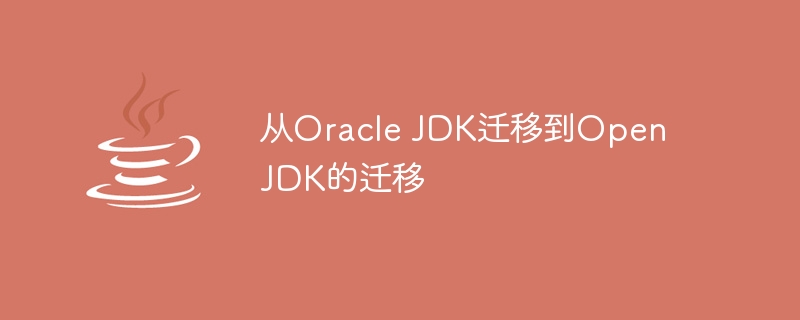

Let us first discuss the necessity of migration. Therefore, starting in January 2019, enterprises must purchase a commercial license (i.e. purchase from Oracle) to receive software upgrades, as Oracle announced in 2018, maintain Oracle Java, update to the latest patch level, and pay membership fees . You can get an idea of the price by knowing that each server core requires licensing, which costs $25 per month.
Additionally, even if there is only one Java server in the cluster, if it is virtualized, the license fee will apply to all "cores" of the server.
Oracle has instituted membership fees for any latest version beyond Oracle Java JE 8 Patch 211 and JDK 11, and from a security vulnerability perspective does not want to keep versions at older, unsupported patch levels . Therefore, we have to decide whether we really need to install Oracle Java JE or JDK to run any application on the server.
For each server you have, select the appropriate option for each server.
If you do not need Oracle Java, please uninstall it.
If the open source version meets your needs, please choose to use the open source version again.
Let’s first take a look at the highlights of the latest non-billable Java version supported by Oracle, Java 1.8.0.202 (64-bit).
Licensing is the biggest difference between Open JDK and Oracle JDK. Open JDK has the GNU General Public License and is completely open source java. Oracle JDK requires a commercial license according to the Binary Oracle Code License Agreement.
As of January 2019, organizations that want to obtain software updates must purchase a commercial license (from Oracle).
In the past, Oracle JDK performed better than Open JDK. However, Open JDK performance is improving. And the Open JDK community's contributions often exceed those of Oracle JDK.
This really comes down to support, as Open JDK shares 99.9% of its code with Oracle JDK (depending on which vendor you get it from).
Support for open JDK versions is as follows -
Open JDK 6 (1.6) 5.3 6.0 7.0 N/A, December 2016
Open JDK 7 (1.7) 5.9 6.3 7.0 N/A June 2020
Open JDK 8 (1.8) N/A 6.6 7.1 8.0 May 2026
Open JDK 11 N/A N/A 7.6 8.0 October 2024
For production deployments of Open JDK on RHEL and Windows, the Service Level Agreement (SLA) and Coverage (SoC) are defined in the Production Support Scope and Production Support Service Terms respectively.
Oracle releases a version every three years, while Open JDK releases a version every six months.
Open JDK is licensed under the GNU General Public License (GNU GPL) version 2, with a linking exception, in contrast to the Oracle Binary Code License for Oracle JDK.
Since the Oracle JDK build process is based on the Open JDK build process, there are no significant technical differences between the two. Oracle's performance is far superior in terms of responsiveness and JVM performance. Because it takes its business customers very seriously. It places more emphasis on stability. Open JDK, on the other hand, will provide updates more frequently. Therefore, we may encounter instability issues.
While comparing the features and settings, we can observe that Open JDK has font rendering features while Oracle product has flight logging, Java mission control and application class data sharing features. In addition, Oracle provides superior rendering and additional garbage collection options.
Unlike Open JDK, which is jointly created by Oracle, Open JDK, and the Java community, Oracle JDK is entirely developed by Oracle Corporation. But well-known companies such as Red Hat, Azul Systems, IBM, Apple INC. and SAP AG are also actively contributing to its development.
Maintain Oracle Java, update to the latest patch levels, and pay membership fees. You can get an idea of the price by understanding that each server core requires a license, which costs $25 per month. Additionally, even if there is only one Java server in the cluster, if it is virtualized, the license price will apply to all cores of the server.
Features |
ORACLE JDK |
Open JDK |
|---|---|---|
Long term support options |
Java 8 until 2022 (Premium Support) and March 2025 (Extended Support) Java 11 until September 2023 (Premium Support) and September 2026 (Extended Support) |
The support period of each version is one month, so if you want to use the supported Java version, you must update the JDK version |
TCK COMPLIANCE |
Meets the requirements |
Meets the requirements |
Free/Commercial Basics |
Requires purchase of license. The number of licenses is based on the number of processors, cores and users using Java. |
JDK is free. GNU General Public License V2 (with classpath exception) (GPLv2 CPE) |
support |
Oracle |
Community |
cost |
USD 40.500 per year |
free |
After careful inspection, it is obvious that in the debate between Open JDK and Oracle JDK, Open JDK has a considerable advantage. Because Open JDK is an open source platform, Java developers are encouraged to contribute to further developing the platform. We end up witnessing a wealth of creative work and objects from several outstanding Java developers who use Open JDK and have been active contributors to Oracle JDK.
The above is the detailed content of Migration from Oracle JDK to Open JDK. For more information, please follow other related articles on the PHP Chinese website!




